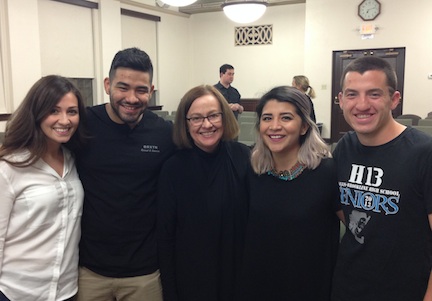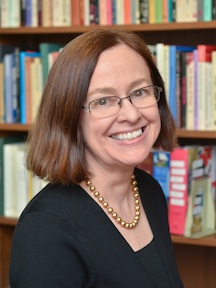By Rolena Adorno
When Jean E. Howard, Chairman of Phi Beta Kappa’s Committee on the Visiting Scholar Program and George Delacorte Professor in the Humanities at Columbia University, invited me to be a Phi Beta Kappa Visiting Scholar for the academic year 2016-2017, I did not hesitate. I accepted immediately, hoping that I would be able to contribute, in some small way, to the exchange of ideas among students and scholars at various universities. But I could not have imagined that I would be these exchanges’ greatest beneficiary. Nor did I expect to receive more than a couple of invitations. (The Program is organized such that colleges and universities with Phi Beta Kappa chapters are invited to request, from the list of some fifteen Scholars appointed each year, the visit of one of them.)
I anticipated only a few invitations because who ever heard of the field of literary and cultural studies called “colonial Latin American literature”? The colonial literature of Latin America goes from Columbus’s account of his 1492 voyage to the era of Latin American Independence. It includes the Spanish chronicles of “discovery and conquest” of the Americas, some of them turned into Renaissance-style epic poems; the lyric poetry and satire of the Hispanic Baroque; the essays that promoted the cause of political independence from Spain; and the post-Independence, neo-classical, and Romantic poetry that beckoned the muses of literature and learning to come to the New World. Aware of my academic field’s location on the margins of mainstream academic disciplines, and to give an idea of what I could do if asked, I prepared a selection of some fourteen topics, complete with lecture titles and abstracts, for Phi Beta Kappa to distribute to potential host institutions.
The reader will be surprised to learn (as was I) that my seemingly remote and esoteric-sounding interests generated eight invitations and, therefore, eight unique and unforgettable campus visits. They ranged from small liberal arts colleges to large state and private universities and were spread over nearly every part of the country: the University of South Carolina, the University of Mississippi, Illinois College, Rutgers University–New Brunswick, Colgate University, Claremont-McKenna College, the University of Redlands, and for the finale, Willamette University.
At each institution I gave a public lecture, open to the college or university and its communities, plus two or three (sometimes four) classroom or seminar discussions, during which the host professor invited me to offer one of my fourteen topics as it fit into his or her program of study for the semester. These invitations came from professors in the departments of Anthropology, History, and Spanish. Overall, my eight visits offered me an astounding variety of formal and informal interactions with students (the Phi Beta Kappa program emphasizes undergraduate participation), as well as professors, university staff members, and in some cases, non-university community members. I also met with groups of students for open, preannounced hours of conversation and/or with individual students on topics of mutual interest.

At the University of Redlands, Thursday, March 9. L-R: Alexandria Michel, Guillermo Muñiz, Rolena Adorno, Karla Ramírez, and Erik Chazin.
From my first visit to the University of South Carolina onward, there quickly emerged patterns of interest that came to characterize my entire year’s experiences. These topics gravitated around three principal questions: our understanding of how historical accounts of the discovery and conquests of the Americas are shaped by the narrative tradition that reported them; the role of the Spanish language in the world from 1492 to today, when it is the United States’ second language and the second or third most-spoken language in the world; and the origin and transformation of Columbus Day as a national holiday. In short, although neither a native speaker of Spanish nor a person of Latin or Latino American descent, I was welcomed as a personally disinterested and credible spokesperson for those linguistic and cultural traditions. (Despite the six vowels of my six-syllable name, my own background is rural Midwestern German-American, and the language of my immigrant ancestors was German. “Adorno” is my married name, and it is Italian, as is the surname of T.W. Adorno, who used that of his Genoese mother.)
At the University of South Carolina, we had a long and riveting discussion about race and ethnicity that emerged from my presentation about how black African slaves were represented in the early accounts of Spanish conquest; at Illinois College, I met with the members of the executive committee of their newly created Latino student organization, “Nuestra Casa,” and we discussed their plans for going forward; at Rutgers University I met with university administrators and professors engaged with students of minority background, and we discussed the challenges those students face as first-generation college students (of which I, too, was one, half a century ago); this was followed by a long and probing conversation with students of those backgrounds and interests.
At Colgate University my lecture about the relationship of our understanding of history and the narrative accounts on which they were based drew outstanding questions and comments from students and faculty members alike; at Claremont-McKenna College we entertained the question of the Spanish language and the place of the Spanish and Latin American literary-cultural traditions and their diasporas in the world today; at the University of Redlands, we examined the account of a native Andean (Amerindian) writer about his experiences of living under Spanish colonialism in the Peruvian viceroyalty; and at Willamette University, in a wonderful setting—the personal senatorial library collection of US Senator Mark O. Hatfield, Willamette alumnus and later professor—we considered how and why we are perpetually fascinated by colorful, Spanish-conquest-era accounts about shipwrecked Spanish sailors and other expeditionary members “going native.”
My one-sentence summary of all these exchanges boils down to this: my teaching and research interests in a remote period of Spanish experience in the Americas offered the opportunity to discuss issues that are incandescently alive in American university and public life today, and doing so at a “contemplative distance” makes it possible to engage topics of passionate contemporary interest without provoking the passions that have generated them.
The single anecdote that best summarizes my year comes from an unexpected quarter: a young African-American girl, between ten and twelve years of age, who attended my University of Mississippi public lecture with an older couple that I assumed to be, and will call here, her grandparents. (The reader will remember that the University of Mississippi’s history includes its racial integration in 1962 by US Air Force veteran James Meredith, escorted onto the campus by US Marshals, as well as much more recent controversies about the South Carolina state flag and campus debates about the place of Confederate monuments and other commemorations on campus.) This was the setting, and the historical background, in which I delivered, on September 22, 2016, during Hispanic Heritage Month, one of my most popular lectures: “What Does Columbus Day Mean Now? Or Why Hispanic Heritage Month Matters.”
Sitting in the front row, directly in front of me, was the young African-American girl and her grandparents. I thought, “Oh, the poor dear! She’ll have to listen to me for nearly an hour. But wait! She has brought paper and colored pencils with her; she will be able to entertain herself during the coming hour!” I mentally thanked her grandparents for their forethought.
I gave my lecture, and the first follow-up question came from a faculty member in the back row of the auditorium. I answered. The second hand to go up was my young friend. “Yes?” I said. She asked: “I want to know what makes Latino Americans and African Americans and Native Americans special.” To gather my wits before attempting to answer this profound inquiry, I asked her to turn to the audience and repeat the question so that all could hear it. She did.
I was on the spot, but I answered:
“Your question suggests to me that you are taking the point of view ‘from the outside,’ that is, from the viewpoint of someone who is not a member of any of those groups and is perhaps viewing all of them as though they were somehow the same, not different from one another, and probably not seen as ‘special.’ So here’s my answer: the question you raise makes it imperative for all of us, from whatever background and tradition we come, to know our people’s history, to know about, and hold in highest regard, our respective histories and traditions. And those traditions include the holidays that we observe and how we observe them, and that includes details right down to what we eat for those special holiday meals. These are the things we must cherish, and these are the things that make all of us, each in our respective traditions, special. Does this answer your question?”
She nodded. In the silence that followed—because who could ask another question after that!—I glanced down at the t-shirt she was wearing. In glittering sequins it read: “Love who you are.” In the continuing, increasingly awkward silence that followed, I asked if she would share with us the saying on her t-shirt. She did, answering in a firm voice, “Love who you are.” “That’s the rest of the answer to your question,” I said. And the auditorium burst into applause. I was off the hook.
She and her grandparents came up to me afterward to shake my hand. I asked her name, which she told me; it is a lovely name that I will always remember, and I told her, “Keep right on asking the hard questions, and never stop!”
A few days later, back in New Haven, it occurred to me to Google the key phrase, and I learned (and listened to) the song of a young recording artist, Harris J, who is a British citizen, a Muslim of South Asian Indian and also Irish heritage: “Love who you are.”
That sums it up: We always learn from the young.
Rolena Adorno is the Sterling Professor of Spanish at Yale University, a fellow of the American Academy of Arts and Sciences, and an honorary professor at La Pontificia Universidad Católica del Perú. She served as a Phi Beta Kappa Visiting Scholar during the 2016-2017 academic year.




